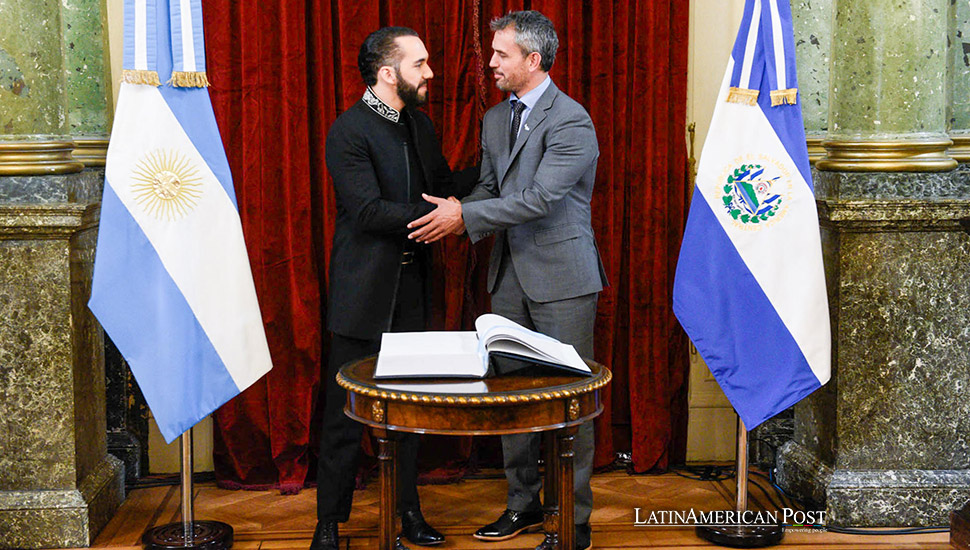Argentina and El Salvador Unite in Historic Anti-Crime Pact

In a landmark agreement, Argentina and El Salvador signed a joint declaration pledging cooperation in the fight against organized crime. The deal reflects a paradigm shift in their approach to narcoterrorism, laying out eight guiding principles aimed at strengthening state sovereignty and security.
Territorial Control and Sovereign
The signing of the “New Doctrine Against Organized Crime” between Argentina and El Salvador marks a pivotal moment in both nations’ fight against organized crime, narcoterrorism, and money laundering. Spearheaded by Argentina’s Minister of Security, Patricia Bullrich, and El Salvador’s Minister of Justice and Security, Gustavo Villatoro, this eight-principle agreement underscores a collective commitment to regaining control over national territories and combating criminal organizations with unwavering state power.
The agreement comes as part of Salvadoran President Nayib Bukele’s official visit to Argentina, emphasizing the importance of international cooperation in addressing the rise of organized crime across Latin America. As Bullrich celebrated on social media, the “historic agreement” represents a “revolutionary” shift in how both governments will handle crime, aligning themselves firmly with the victims rather than the perpetrators.
One of the core principles outlined in the doctrine focuses on the state’s sovereignty over its territory. The declaration asserts that the state must retain complete control over its land, refusing to concede any space to criminal organizations. This emphasis on territorial integrity is seen as a cornerstone of national security. According to the agreement, the state must act decisively to dismantle criminal operations that threaten to undermine its authority, ensuring that no part of the country becomes a haven for drug traffickers or organized crime syndicates.
Coordinated Action Against Narcoterrorism
The second key element of the doctrine revolves around coordinated action to combat narcoterrorism, drug trafficking, and money laundering. Argentina and El Salvador pledged to share intelligence, exchange information, and establish stable financing mechanisms to bolster security systems in both countries. By creating a framework for collaborative efforts, both nations aim to disrupt the networks that enable the illegal drug trade and organized crime to flourish.
A critical aspect of this coordination involves rejecting policies that promote access to illegal drugs, which both governments view as detrimental to their broader anti-crime strategy. They stress the state’s obligation to reduce the illicit drug supply to a minimum and assert that any measures that weaken this commitment risk emboldening criminal networks. Moreover, the doctrine calls for a robust legal framework that imposes harsher penalties on members of mafia-style organizations and expanded powers for law enforcement to more effectively target high-level criminals.
The ministers also stressed the importance of combating money laundering, which often serves as the financial backbone of organized crime. Through enhanced cooperation, the two countries plan to implement parallel investigations into laundering operations associated with organized crime, ensuring that criminals’ financial networks are dismantled alongside their narcotics operations. Additionally, the doctrine advocates for the swift restitution of assets seized from criminal enterprises to the victims, positioning the state as a protector of those harmed by narcoterrorism.
Strengthening Law Enforcement and Criminal Justice
Recognizing the crucial role of law enforcement in the battle against organized crime, the agreement also highlights the need to “dignify” the police force. This principle centers on supporting and empowering police and security personnel to carry out their duties effectively. Argentina and El Salvador affirmed their commitment to providing police officers with the necessary resources, training, and legal protections to combat crime more efficiently.
The doctrine underscores the need for joint strategies and knowledge-sharing between the two nations. These strategies include exchange programs for police officers and security experts, facilitating the transfer of best practices, and fostering deeper collaboration between the two countries’ law enforcement agencies. This exchange of personnel and expertise is vital to building a more potent, capable police force that can tackle the evolving nature of organized crime.
Moreover, the agreement pushes for significant reforms to criminal justice systems. Among these are proposals to amend penal codes by introducing new legal categories and increasing the severity of penalties for repeat offenders and juvenile criminals. Reforms also aim to bolster the legal framework for self-defense and duties performed by law enforcement, ensuring that officers are protected while performing their jobs. Additionally, the doctrine calls for reducing the risk of victims being retraumatized through the legal process, emphasizing the need for laws prioritizing the well-being of those affected by criminal acts.
Redefining the Role of Prisons and Legal Reforms
Another critical aspect of the agreement is the overhaul of prison management. The doctrine stresses that the state must maintain control over its prison system, particularly in ensuring that criminal activities do not continue behind bars. The principle advocates for identifying and classifying inmates based on the level of risk they pose and the implementation of stricter measures for high-risk prisoners.
These reforms include permanent controls within prisons and the elimination of unrestricted communication among inmates. Unrestricted communication has often enabled criminal leaders to continue orchestrating illegal activities from within the penitentiary system. By cutting off these channels, both countries hope to weaken the internal networks that allow criminal organizations to thrive even while their leaders are incarcerated.
Another doctrine focuses on eliminating bureaucratic inefficiencies obstructing justice and inadvertently supporting criminal activity. It calls for streamlining legal procedures, with particular attention paid to institutions co-opted to protect narrow, sectarian interests. The ministers emphasized the need for harmonizing police, legal, and criminal procedures across Latin America to facilitate more cohesive and effective regional collaboration in the fight against crime.
Lastly, the doctrine addresses the role of international organizations in the global fight against narcoterrorism and organized crime. Argentina and El Salvador call for these bodies to remain impartial and avoid ideological biases that could hinder law enforcement efforts. The ministers criticized international institutions that, in their view, have inadvertently empowered criminal organizations by undermining state efforts to prevent crime. They urged a more balanced approach that supports, rather than critiques, state-led crime prevention strategies.
Also read: Milei’s Tough Austerity Measures: Reshaping Argentina’s Economic Future
The “New Doctrine Against Organized Crime” represents a bold step forward for both Argentina and El Salvador in their fight against narcoterrorism and organized crime. The agreement signals a new era in pursuing justice and security across Latin America by reinforcing state sovereignty, supporting law enforcement, and enhancing regional cooperation. Through this shared commitment to combating criminal networks, both nations aim to strengthen their respective legal and security systems, providing a safer environment for their citizens and standing firm in the face of organized crime





